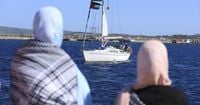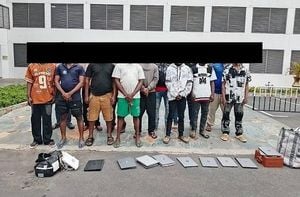On a brisk September day in Paris, the historic Bastille Square transformed into a sea of banners, chants, and determined faces. Pro-Palestinian activists, ordinary French citizens, and anti-Zionist Jews gathered in force, united in support of the Global Sumud Flotilla—an ambitious civilian mission aiming to break Israel’s years-long blockade of Gaza and deliver desperately needed humanitarian aid.
The rally, held on September 26, 2025, was more than just a show of solidarity; it was a loud, visible demand for action. Protesters hoisted banners reading, "The Nakba continues," and "Support the flotillas and Palestine will win," while the crowd’s chants of "Break the blockade on Gaza" and "Freedom for Palestine" echoed through the square. According to Anadolu Agency, the demonstration drew not only seasoned activists but also French Jews opposed to Zionism, highlighting a broad coalition of support for the flotilla’s mission.
Sarah Katz, a member of the Union of French Jews for Peace (UJFP), was among the rally’s most passionate voices. Having lived in Gaza for two years, Katz spoke to Anadolu about the urgency of the situation: "This shows there is an awareness that what is happening in Gaza is absolutely unbearable." She condemned the indiscriminate violence and systematic destruction in Gaza, calling for an immediate end to the suffering. Katz also recalled Israel’s deadly 2010 raid on the Mavi Marmara aid ship, emphasizing that such acts of aggression have only strengthened the resolve of activists worldwide. "But flotillas around the world decided then that as long as Gaza remains under blockade, ships will keep coming," she said, denouncing the use of famine as a "weapon of war" as unacceptable.
While Paris rallied, the Global Sumud Flotilla itself was already braving the open seas. On September 25, 2025, the convoy set sail from Greece, its decks crowded with lawyers, parliamentarians, activists, and, notably, Swedish climate campaigner Greta Thunberg. According to Reuters, Thunberg was seen aboard a ship off Crete, standing beside a Palestinian flag as the flotilla pressed eastward despite rising tensions and explicit Israeli warnings.
The flotilla’s mission is straightforward yet fraught with risk: break Israel’s naval blockade and deliver food and medical supplies to Gaza’s besieged population. Organizers, as reported by Newsweek, have faced fierce opposition from Israel, which maintains that any attempt to breach the blockade is a violation of international law and could potentially aid Hamas. Israeli officials insist that humanitarian aid can be delivered through Israeli ports under proper inspection. Flotilla organizers, however, counter that the blockade itself is unlawful and that their mission is strictly humanitarian, with no ties to extremist groups.
The stakes have only grown higher in recent weeks. Organizers reported at least a dozen drone attacks on the flotilla as it crossed the Mediterranean, with the most recent explosions occurring near the Greek island of Crete. Several vessels were damaged, though, fortunately, no casualties were confirmed. Flotilla leaders were quick to blame Israel for the attacks, and the incident prompted swift international responses.
Italy and Spain, both with citizens aboard the flotilla, deployed naval warships to ensure the convoy’s safety. According to Newsweek, Spain dispatched a naval vessel after the latest drone strike, with Prime Minister Pedro Sánchez emphasizing, "The government of Spain insists that international law be respected and that the right of our citizens should be respected to sail through the Mediterranean in safe conditions." Around 15 Spaniards are participating in the mission, and Spain’s intervention marks one of its most direct involvements in the Gaza crisis to date.
Italy, too, responded with urgency, sending two frigates on September 24 and 25. Italian Minister of Defense Guido Crosetto condemned the drone strikes as "totally unacceptable" and made clear that the ships were dispatched to assist Italian nationals aboard the flotilla. Prime Minister Giorgia Meloni, while critical of the mission as "dangerous and irresponsible," has faced mounting domestic pressure as protests and strikes in support of Gaza sweep across Italy.
The journey itself has become a test of endurance and resolve. The flotilla, a coalition of roughly 50 civilian boats, departed from Barcelona in August, loaded with food and medical supplies. As of September 26, the convoy was approximately 500 nautical miles from Gaza and organizers expect to arrive within a week. The mission unfolds as the war in Gaza approaches its third year, and aid agencies warn that conditions for civilians have become catastrophic. Food, fuel, and medicine are in perilously short supply, and international calls for relief have grown ever more urgent.
Greta Thunberg, who has become a vocal figure within the flotilla, used social media to warn of a potentially "deadly" Israeli attack. In a pointed message, she declared, "We call on governments everywhere to fulfill their legal obligation and their complicity in the genocide." Her presence has drawn additional global attention to the mission—and, perhaps, to the risks involved. The flotilla also reported bizarre incidents of radio jamming, with ABBA’s "Lay All Your Love On Me" blasting over their communications. Yasemin Acar, a GSF member, explained in a video, "They’re jamming our radio. We don’t know where this is coming from, the sound, but other vessels are experiencing the same thing." The flotilla blamed Israel for the stunt, which some interpreted as a pointed reference to Thunberg’s Swedish nationality.
Israel, for its part, remains steadfast in its opposition. Officials have repeated their vow to block the flotilla from reaching Gaza, arguing that their naval blockade is both legal and necessary to prevent weapons from reaching Hamas. The Israeli government contends that any alternative routes for aid delivery undermine security and risk empowering militants. Organizers of the flotilla reject these claims, maintaining that their mission is strictly humanitarian and that the blockade itself is the real violation of international law.
As the Global Sumud Flotilla presses on, the Mediterranean has become a stage for an increasingly tense standoff. With European warships now shadowing the convoy and activists warning of imminent danger, the mission could soon escalate into a major international flashpoint. The outcome remains uncertain, but the determination of those involved—both at sea and on the streets of Paris—shows no sign of wavering.
The coming days will reveal whether the flotilla can break through the blockade and deliver its cargo of hope to Gaza, or whether the standoff will harden into yet another chapter of confrontation in a region already marked by deep scars. For now, the world watches as a convoy of boats—and the voices that support them—sail into history.




